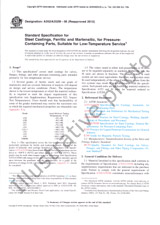We need your consent to use the individual data so that you can see information about your interests, among other things. Click "OK" to give your consent.
ASTM D2066-07(2020)
Standard Test Methods for Relative Tinting Strength of Paste-Type Printing Ink Dispersions
Translate name
STANDARD published on 1.6.2020
The information about the standard:
Designation standards: ASTM D2066-07(2020)
Publication date standards: 1.6.2020
SKU: NS-997567
The number of pages: 7
Approximate weight : 21 g (0.05 lbs)
Country: American technical standard
Category: Technical standards ASTM
The category - similar standards:
Annotation of standard text ASTM D2066-07(2020) :
Keywords:
automated mixing, colorimeter, densitometer, FlackTek Speed Mixer, Kubelka-Munk equation, pigment dispersions, pigment flushes, printing inks, relative tinting strength, spectrophotometer,, ICS Number Code 87.080 (Inks. Printing inks)
Additional information
| Significance and Use | ||||||||||||||||||||||||
|
5.1 Tinting strength is an essential property of printing ink dispersions. Although test results on wet drawdowns and tints do not guarantee equivalency of dry printed ink films, they provide useful parameters for quality assurance of established formulations, gaging relative degree of dispersion, and estimating the color value of colorants from different batches, sources, or grades. |
||||||||||||||||||||||||
| 1. Scope | ||||||||||||||||||||||||
|
1.1 These test methods cover procedures for determining the relative tinting strength of paste-type printing ink dispersions by visual or instrumental evaluation of tints prepared by manual or automated mixing. 1.2 These test methods are applicable to paste-type printing inks, flushed pigments, and other pigment dispersions that are essentially nonvolatile under ordinary room conditions and for which there is a wet reference standard of the same pigmentation and consistency. With proper choice of tinting base, they are applicable to dispersions of any color, including black and white. Note 1: The instrumental procedures for tinting strength are
similar in principle to those described in Test Methods
D387, D2745, D4838, and D6531.
1.3 The values stated in SI units are to be regarded as the standard. The values given in parentheses are for information only. 1.4 This standard does not purport to address all of the safety concerns, if any, associated with its use. It is the responsibility of the user of this standard to establish appropriate safety, health, and environmental practices and determine the applicability of regulatory limitations prior to use. 1.5 This international standard was developed in accordance with internationally recognized principles on standardization established in the Decision on Principles for the Development of International Standards, Guides and Recommendations issued by the World Trade Organization Technical Barriers to Trade (TBT) Committee. |
||||||||||||||||||||||||
| 2. Referenced Documents | ||||||||||||||||||||||||
|
We recommend:
Technical standards updating
Do you want to make sure you use only the valid technical standards?
We can offer you a solution which will provide you a monthly overview concerning the updating of standards which you use.
Would you like to know more? Look at this page.




 Cookies
Cookies
